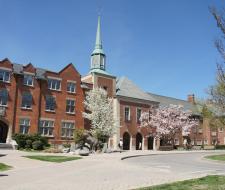Best international colleges in Canada 2026
This content was developed and approved with active participation of Chris Skidmore.
In the process of preparing the material, we referenced the following sources:
- https://www.topuniversities.com/student-info/student-finance/how-much-does-it-cost-study-canada
- https://en.wikipedia.org/wiki/List_of_colleges_in_Canada.
-
 from 3995 $CAD / 2 weeks
from 3995 $CAD / 2 weeks -
 CIC has more top universities in the partnership program than any other school
CIC has more top universities in the partnership program than any other school CanadaToronto, OntarioCurrently watching: 8from 49400 $CAD / 10 months
CanadaToronto, OntarioCurrently watching: 8from 49400 $CAD / 10 months -
 from 6800 $CAD / 4 weeks
from 6800 $CAD / 4 weeks -
 In 2023 100% graduates achieved Ontario Secondary School Diploma (OSSD)
In 2023 100% graduates achieved Ontario Secondary School Diploma (OSSD) CanadaToronto, OntarioCurrently watching: 5from 1200.00 $CAD / month
CanadaToronto, OntarioCurrently watching: 5from 1200.00 $CAD / month -
 from 75400.00 $CAD / year
from 75400.00 $CAD / year -
 from 24280.00 $CAD / year
from 24280.00 $CAD / year -

-

-
 from 9300.00 $CAD / year
from 9300.00 $CAD / year -
 from 15000.00 $CAD / year
from 15000.00 $CAD / year
International colleges (or Six-form Colleges, Tutorial Colleges) are designed for high school students. The main goal of these institutions concerns preparing for entering the university you have chosen. The popularity of international colleges increases annually.
Preparation of foreign students is conducted for the successful enrolment in universities of the world. Deciding on pursuing education in colleges, the students can take diverse programs, which have gained global recognition: High School Diploma from the USA, the program of International Baccalaureate from Switzerland (IB), etc.
As a rule, the schoolchildren who study at final grades of secondary education, can enter private colleges. The international college in Canada is the link between the middle school and higher educational institutions, combining specific features of schools and universities. Upon completing studies at the best colleges in Canada the graduates are awarded Bachelor degree or specialization. Among the main advantages of getting an education in international colleges in Canada, it is worth noting the following:
-
Studying takes less time, if we compare it with secondary schools in the UK or the USA.
As for the cost of studying, colleges are less expensive compared to most Canadian universities.
-
Education in private colleges in Canada is transition period, when the pupils gradually get used to the orders and traditions of higher educational institutions, studying disciplines, namely English or other foreign language and subjects chosen by the student in secondary schools.
The experts of educational portal Smapse.com offer the private colleges in Canada. In this section of our website you can find a list of the best international colleges in Canada, their description, ranking, as well as tuition prices. The education in Canada is a great opportunity to ensure the successful future of the child, as the diplomas and certificates of completion of secondary and higher educational institutions of Canada are highly regarded by international corporations and the best higher education institutions around the world.
Alternative destinations
Key Features of the Best Colleges in Canada
-
Canada's international colleges, often rated among the top Canada colleges, primarily accept students aged 15-16, typically after 9th or 11th grade. Here are some noteworthy features:
-
Focused Curriculum: These colleges emphasize intensive academic preparation, sidelining leisure and entertainment. By senior years, it's expected students have grasped key social behaviors, emphasizing linguistic and academic growth.
-
Individualized Learning: Students can engage in numerous individual lessons and elective courses within their preferred disciplines. This facilitates in-depth exploration of subjects crucial for university admission.
-
Democratic Environment: International colleges in Canada foster a relaxed atmosphere. While there's no formal uniform, there's an informal rapport between teachers and students. Strict rules apply concerning academic monitoring, substance abuse, and residence arrangements.
-
Small Class Sizes: Emphasizing personalized learning, these colleges usually cap classes at 6 students, often facilitating 2-3 students per class.
-
World-class Education: The educational programs at the best college in Canada are contemporary and meet global academic standards. They cater to both university aspirants and those seeking professional qualifications. Their approach results in a commendable university admission rate exceeding 90%.
-
Cost-effective: Pursuing Bachelor's, diploma, or certificate programs at these international colleges costs, on average, 1.5-2 times less than universities. Yet, their value isn't diminished; top colleges of Canada holding high global ranks are globally respected.
- Streamlined Transfers: Switching programs is straightforward. Good academic performance and proficiency in English (evidenced by TOEFL / IELTS ) usually suffice. This applies both within the college and to partner universities.
 Russia, the CIS and Europe Students Admission Regional Director at the National Mathematics and Science College
Russia, the CIS and Europe Students Admission Regional Director at the National Mathematics and Science CollegeWhat subjects have been most commonly chosen in recent years?
STEM (science, technology, engineering, mathematics) is becoming incredibly popular: it is logical, because it is the real key to the future, capable of providing you with a great job and a high salary. Biology, chemistry, computer science, physics, mathematics are consistently popular because they are basic to any STEM degree.
Programs in Colleges in Canada
-
Advanced Academic Studying (2-6 months): Perfect for in-depth exploration of 1-3 subjects prior to university enrollment.
-
University Foundation (8-9 months): A comprehensive pre-university curriculum merging subject studies with an intensive academic English course.
-
GCSE (usually 1 year): Commonly finished by students aged 15-16, it fills gaps in secondary education.
-
Certificate or Diploma (32-52 weeks): Available at basic or advanced levels, this is ideal for careers not demanding extensive theoretical expertise.
-
Bachelor's Degree (3-4 years): The initial phase of professional higher education, equipping students for rapid career growth.

What are the most popular subjects in recent years?
The passion of STEM students (science, mathematics, technology) is stable, because many graduates of Canadian schools go to conquer engineering specialties. But Canada has the right direction for everyone - business and entrepreneurship, music, health sciences and more.
5 Tips How to choose the Best College in Canada
-
Define Your Goals: Understand your desired university specialty and career direction.
-
Research Rankings: Study rankings of both international colleges in Canada and universities. Don't fixate solely on top-ranked institutions; sometimes lesser-known colleges offer more tailored programs.
-
Partnership Programs: Identify colleges with partnerships with higher education institutions. Such alliances might provide guaranteed university admissions or advanced placements.
-
Consider Professional Programs: Some international colleges offer professional, advanced study programs and specialized qualifications. Such opportunities often come at more affordable international colleges Canada fees while retaining a high value.
-
Public vs. Private: While private colleges usually boast modern infrastructure and a broader program selection, public colleges can be more budget-friendly.
For tailored advice and insights on the best college in Canada for your needs, consider consulting with experts like those at SMAPSE. They can provide a detailed perspective on colleges of Canada, ensuring you make an informed choice.
Colleges in Canada. Cost and fees
1. Tuition Fees
Studying in a Canadian college involves significant tuition costs. According to data of 2021, tuition fees at Canadian colleges for local students vary from CAD 2,500 to CAD 8,000 per academic year. Such variations depend on the chosen educational program and province where the educational institution is located. However, foreign students usually pay more, which accounts from CAD 12,000 to CAD 25,000 per academic year.
2. Additional Academic Fees
In addition to the base cost of studying, students should take into account ancillary fees, including charges for student union memberships, health services, athletics, and other campus facilities. Additional costs may amount to CAD 500 - 2,000 to the annual tuition fee. Also, students should be ready to pay for books, equipment, and other necessary academic materials.
3. Living Expenses
The cost of living in Canada significantly ranges depending on the province and city. For example, such cities as Vancouver and Toronto are featured by high living costs. In case of on-campus accommodation in colleges expenses vary from CAD 8,000 to CAD 12,000 per academic year, including meals. Off-campus housing significantly ranges, although students should be ready to pay from CAD 600 to CAD 1,500 per month for rent, which depends on the location and type of accommodation. Additional living expenses, such as transportation, groceries, and personal items, should also be budgeted for.
4. Scholarships and Financial Aid
Many prestigious colleges in Canada provide scholarships and financial aid to local and foreign students, allowing them to compensate for the cost of studying. The reasons for awarding scholarship may be the following: merit-based, need-based, or specific (applicable to certain educational programs or demographics). Foreign students are recommended to research and apply to these opportunities for reducing costs of studying in Canada in advance.
5. International Student Considerations
Foreign students are also waiting for additional costs, which may include visa application fees, travel expenses to and from Canada, and health insurance. As for health insurance, it is compulsory in many provinces for foreign students and in many cases it is not included in the standard tuition fees.
Top colleges in Canada provide high quality education and skills practice, so foreign students should be prepared for significant costs. Proper financial planning and thorough selection of educational institutions, and exploring scholarship and financial aid options, guarantee a valuable and stress-free educational experience.
How to apply to an International College in Canada?
1. Research and Selection
The first stage of the application process in Canadian college concerns thorough research of educational institutions. Many top colleges are located in Canada, offering various educational programs. You should prepare a list of colleges, offering programs complying with your area of interest (applied arts, sciences, business, etc). When selecting, take into account such factors as the college's reputation, its ranking, location, tuition fees, and the support they provide for foreign students.
2. Application Process
When you have chosen several educational institutions, the next stage stipulates initiating the application process. Most Canadian colleges have an online application system. The standard requirement stipulates filling out your personal information, academic performance record, and choosing the educational program. Make sure that you meet application deadlines, varying from one institution to another and differing for foreign students.
3. Documentation
Foreign students are usually required to submit several documents, which include:
-
Academic performance records from previous educational institutions.
-
Confirmation of language knowledge (IELTS, TOEFL, or other recognized tests).
-
Letters of recommendation.
-
A personal essay detailing your interest in studying under a certain course.
-
Passport copy.
Some colleges may require certified translations of your documents if their language is not in English or French.
4. Application Fee
Almost all colleges charge a non-refundable application fee, which usually ranges from CAD 100 to CAD 250. Make sure to check the exact amount on the college's official website.
5. Post-Application
Upon submission, you need time to wait for the admission decision. If the candidate meets the requirements, the student will obtain a formal Letter of Acceptance (LOA). This document is important, as without it study permit applications will not be issued. When your LOA is received, it is necessary to apply for a Canadian study permit, acting as a student visa. If a foreign student has a study permit, study and often work part-time in Canada are allowed.
When you apply to a Canadian international college, attention to the following processes is required, concerning careful planning, selection of educational institutions. If you need more detailed information, visit the official college website or contact the admissions office.
What is the difference between universities and colleges?
Foreign students are provided with the opportunity to choose from a wide array of educational programs, which have specific features. Type of programs and degrees: Universities offer bachelor's, master's, and doctoral degrees. Students can obtain specialization in science, arts, engineering, medicine, humanities, and others. Colleges typically make an emphasis on practical studying, offering programs geared toward specific professions such as technicians, registered nurses, physician assistants, designers, technicians, and others. Academic research activities: Universities are actively engaged in academic research and national research projects. Colleges can conduct applied research and have a collaboration with industry, however partnership is not so extensive compared to universities. Program duration: Duration of university programs is longer compared to college courses. Studying for a bachelor's degree lasts 4 years and a master's degree takes another 1-2 years. Duration of college programs is typically shorter, lasting from a few months to 2-3 years. Admission Requirements: Universities have higher admission requirements, including grades and standardized tests such as the SAT or ACT for international students. Colleges may have less stringent requirements, and some programs may be available to students with no experience or high academic grades.
What are the advantages of a college education?
Students have a chance to obtain prestigious higher education.Less course duration in comparison with universities (1 to 3 years). The cost of studying in college is lower compared to university. Emphasis on hands-on education, universities focus on academic studying. Personalized teaching approach, given the small number of students in a classroom. Students can get a job in the direction of studying immediately after graduation. Opportunity for graduates to work in Canada and receive residency after one year of employment. The students can be awarded scholarships or study grants issued by the Canadian Government, provinces or educational institutions.
What kind of programs of study do colleges have?
Students are provided with the opportunity to choose programs in the following popular directions: Business and Management: Programs in business administration, marketing, finance, accounting, international business and entrepreneurship. Health and Nursing: Nursing, Medical Laboratory Technology, Radiologic Technology, Practical Nursing, Oral Health and Health Sciences. Information Technology: Computer science, software development, network administration, cybersecurity and information systems. Engineering and Technology: Electrical Engineering, Mechanical Engineering, Civil Engineering Technology, Computer Engineering Technology and Architectural Technology. Culinary Arts and the Hospitality Industry: Culinary management, baking and pastry arts, hotel management and tourism. Design and Visual Arts: Graphic design, interior design, animation, fashion design and photography. Social sciences and humanities: psychology, sociology, political science, anthropology, history and literature. Natural sciences: biology, chemistry, ecology, physics and geology. Media and Communication: Journalism, Public Relations, Media Studies and Communication. Education: Pre-school education, primary education and educational support. Specific trades: Automotive Technology, Plumbing, Electrical, Carpentry and Welding. Languages and Linguistics: English as a Second Language (ESL), Linguistics and Translation Studies. Performing arts: music, theater, dance, and film studies.
When are college application deadlines?
1) Fall Admission (September): Applications for fall admission are generally accepted from October through January of the previous year. Deadlines can range from February through May, with some colleges having later deadlines in June or July. 2) Winter Enrollment (January): Applications for winter enrollment are typically submitted in the spring or summer of the year prior to the start of classes. Deadlines may vary from August through October. 3) Summer Admission (May or June, depending on the college): Applications for summer admission are often submitted in the fall or early winter of the previous year. Deadlines can vary from January through March. Keep in mind that these are general time frames, and specific colleges may have slightly different schedules. In addition, some colleges offer rolling admissions, which means that they review applications and make admission decisions as they come in until all spots are filled. In such cases, it is recommended that you apply as early as possible to increase your chances of admission and have enough time to process your visa.
When does college education begin?
Academic year begins in September, January and May. If you have applied for September and for some reason do not arrive in Canada to pursue education, you are allowed to postpone the start of your studies to the next intake of students.In this case, you must notify the university at least 1-2 months in advance.
What is a Canadian college?
Canadian colleges are considered as post-secondary institutions offering diverse vocational, technical and applied programs. The main feature of these institutions concerns their practical approach to studying. Foreign students can choose various courses, which make an emphasis on certain industries, which include business, technology, health sciences, arts, trades and more. Educational programs are aimed at students, who wish to improve skills and knowledge, required for employment.
With what kind of education can one enter college?
No matter your initial knowledge base, applying to college is possible.The educational program chosen by the applicant influences the set of admission requirements. The minimum academic level, which is enough for entering, is a completed high school education.
Is there an age limit for college enrollment?
There is no age limit, but the older the student, the more likely the visa application will be denied. In the case of applying, it is recommended to assess your chances for successful entering and obtaining a visa.
How much does it cost to attend Canadian colleges?
The tuition fee is stipulated by the chosen program, and starts at $17,000 CAD per year. The fees are usually paid in two or three installments. If desired, a student can pay the entire year's tuition at once.
Can I work while attending college?
An international student can work up to 20 hours per week. It is recommended to devote their first academic year to adapting to a new learning environment, and culture in general. Many students start working from the second year of study.
Top 12 best schools in Canada 2026
| 1 | Brookes Shawnigan Lake |
| 2 | Rosseau Lake College |
| 3 | Albert College |
| 4 | Columbia International College |
| 5 | Ridley College |
| 6 | St Andrew's College |
| 7 | Brentwood College School |
| 8 | Pickering College |
| 9 | Bodwell High School |
| 10 | Trafalgar Castle School |
| 11 | Fulford Academy |
| 12 | Shawnigan Lake School |
Top 21 boarding colleges in England 2026
| 1 | Cardiff Sixth Form College |
| 2 | National Mathematics and Science College |
| 3 | Abbey College Cambridge |
| 4 | d'Overbroeck's College |
| 5 | MPW London |
| 6 | CATS Cambridge |
| 7 | Kensington Park |
| 8 | DLD London |
| 9 | King's College St Michael’s |
| 10 | Bellerbys Cambridge |
| 11 | Chelsea Independent College |
| 12 | MPW Cambridge |
| 13 | Bellerbys Brighton |
| 14 | CATS London |
| 15 | St Clare's Oxford |
| 16 | Bishopstrow College |
| 17 | CATS Canterbury |
| 18 | Bellerbys London |
| 19 | Ealing Independent College |
| 20 | Cambridge Tutors College |
| 21 | Abbey Manchester |
Cost of living in Canada
| Expenses - USD/Month. | Min. | Med. |
|---|---|---|
| Accommodation | 294 | 376 |
| Food | 239 | 416 |
| Transportation | 54 | 144 |
| Communications and utilities | 81 | 89 |
| Clothing | 19 | 71 |
| Sports and leisure | 23 | 84 |
| Total | 711 | 1,179 |
| Accommodation in Canada | USD/Month. | |
| Shared room outside of centre | 297 | |
| Shared room in city centre | 380 | |
| 1 bedroom apartment outside of centre | 539 | |
| 1 bedroom apartment in city centre | 690 |
Top 35 best universities and colleges in Canada 2026
| 1 | University of Toronto |
| 2 | McGill University |
| 3 | University of British Columbia |
| 4 | University of Alberta |
| 5 | Simon Fraser University |
| 6 | Montreal University |
| 7 | University of Windsor |
| 8 | York University |
| 9 | University of Guelph |
| 10 | McMaster University |
| 11 | University of Manitoba |
| 12 | University of Waterloo |
| 13 | Royal Roads University |
| 14 | Vancouver Film School |
| 15 | Kwantlen Polytechnic University |
| 16 | University of Calgary |
| 17 | Dalhousie University |
| 18 | Fanshawe College |
| 19 | University of Ottawa |
| 20 | Laval University |
| 21 | Sheridan College |
| 22 | University of Regina |
| 23 | Brock University |
| 24 | Thompson Rivers University |
| 25 | Humber College |
| 26 | Vancouver Island University |
| 27 | Mohawk College |
| 28 | Centennial College Toronto |
| 29 | Niagara College |
| 30 | Capilano University |
| 31 | Seneca College |
| 32 | Algoma University |
| 33 | Saint Clair College |
| 34 | Douglas College |
| 35 | LaSalle College |
Literature and references
-
Top 10 Colleges in Canada
-
Applying to College as an International Student
-
How much does it cost to study in Canada? — QS Top Universities
-
International students in Canada — WIki
-
List of colleges in Canada — Wiki
-
How much does it cost for international students to study in Canada? — The Economic Times
